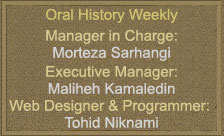| No. 327 | 21 November 2017 |
Interview with the head of Institute of Documentation of National Library and ArchivesOral history of executive agencies has a national budgetEmphasizing on the comprehensive support of Institute of Documentation of National Library and Archives of Iranian Islamic Republic, The organizer of the Oral History Development Program of the countrys executive agencies, said: "We will continue to support and protect this program. Some of the current organizations in the oral history workshops have already an oral history unit, but nevertheless, it is also important to assimilate activities for such organizations."I want to learn Farsi!Abu Ahmad blocked our way near the evening of Monday 15th of Aban 1396 solar hijri calendar (November 6, 2017) in Najaf-Karbala road. As a matter of fact, three others had already asked us to become their guests. All of them said one thing, “Taking a shower, WiFi, a place for sleeping and taking a rest” which we had not accepted. But this last one treated us in a way that we could not accept his request.Memories of Mohammad Sam Kermani and...Two Interviews Which Became a Book Titled "Your Majesty Be Carefree!""Your Majesty Be Carefree (in Persian: Khater Ala Hazrat Asudeh)!" is memoirs and untold words of Mohammad Sam Kermani (1924-2015), one of ministries of Interior and Intelligence and Tourism of Pahlavi regime. This 680-page book was produced by Hamid Davoodabadi and Nargol Publication released it in summer of 2017.Oral History Interview & Importance – Part 30 (Finale)ArchivingThe final phase in the oral history interview process is archiving the transcription and audio, video files and all other relevant documents. The objective is to preserve the interview and provide easy and quick user access. This phase requires detailed and applicable and cost-effective planning conducted by a specific method. Oral History Weekly Magazine Aims and Regulations
Oral History Weekly Magazine wishes to create a suitable place for thoughts and idea development; Its main field would be “Oral History” and subjects as telling & writing memoirs, writing diaries, travelogues, chronologies, and all other subfields of history which are presented in the form of news, articles, reports, notes, interviews and memoirs can be included. There is no limitation on the length of would-be-sent materials. Mentioning the name, academic background and email is necessary. Articles with complete references and bibliography are more credited and an abstract would quite helpful. Weekly is not about to publish any material consisting insults and libels about other people or anything that brings anxiety to public opinion. Weekly can edit and translate the received materials. The published articles and materials are only the writer’s ideas and Oral History Weekly Magazine has no responsibility about their content. |
 Memoirs of Marzieh Hadidchi (Dabbagh) (Part 18) Edited by: Mohsen Kazemi Tehran, Sooreh Mehr Publications Company 2002 (Persian Version) Translated by: Zahra Hosseinian
After Release I released when I was sick and weak physically because of withstanding all those overwhelming tortures were. And I could not walk. My wounds had been infectious and my whole body was paining severely, so that I moved hardly. When I dragged myself along the wall limpingly and reached to the Toopkhaneh square (Imam Khomeini) with a flower-patterned chador over my head, I couldn’t stand on my feet much longer.    |
